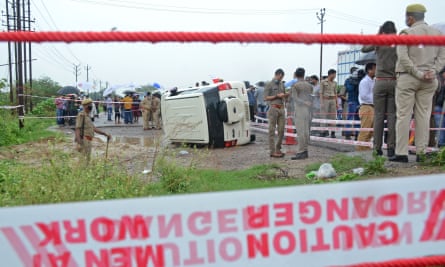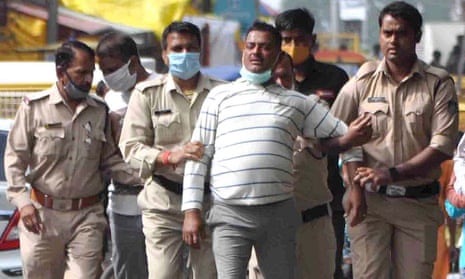Police have shot dead one of India’s most wanted criminals a day after his arrest, sparking accusations of an unofficial killing.
Officials said Vikas Dubey, who was detained over the killing of eight police officers, was shot as he tried to escape from a police vehicle while being driven to his home city in the northern state of Uttar Pradesh.
Within hours of TV stations carrying images of his body lying in a hospital, rights lawyers and activists alleged that police had killed Dubey to prevent him revealing his connections with powerful people.
“This is the most blatant case of extrajudicial killing,” the supreme court lawyer Prashant Bhushan wrote on Twitter. “Dubey was a gangster terrorist who may have deserved to die. But (Uttar Pradesh) police have killed him to shut his mouth.”
Utsav Bains, another supreme court lawyer, asked: “Will we allow police to kill anyone without a court trial?”
And the senior opposition Congress party leader, Priyanka Gandhi, said the people “protecting” Dubey were still free and called for a judicial inquiry into the killing.
Dubey, aged about 50, was accused of more than 60 murders, attempted murders and other crimes. He is alleged to have shot dead an Uttar Pradesh state minister inside a police station in 2001.
Despite those cases and his reputation for ruthlessness, Dubey had built considerable local political links over the past two decades.
On 3 July, eight officers were shot dead when his gang ambushed a police team aiming to arrest him. A nationwide search was launched, during which five of Dubey’s associates, including his bodyguard nephew, were killed.
Police said Dubey was tipped off about the pending raid by local officers, some of whom have been arrested for leaking information to him. Dubey gave himself up in a temple in Madhya Pradesh state on Thursday.
According to the police account, the car transporting him early on Friday overturned on a wet road in Uttar Pradesh and he tried to escape.
“Dubey has been killed in an exchange of fire after he snatched the pistol of our men and tried to flee after firing at them. Four of our men are also injured,” the Kanpur police inspector general, Mohit Agarwal, told reporters.

Uttar Pradesh’s chief minister, Yogi Adityanath, who is a senior member of Narendra Modi’s Bharatiya Janata party, has publicly endorsed police killings as a “deterrent” to crime.
Adityanath’s government has pledged to root out crime from the state and his tenure has coincided with a rise in the number of criminals dying in police shootouts.
“Encounter killings” have a long history in India. For decades they were staged to bypass India’s judicial system when police battled armed separatist movements in West Bengal, Punjab, Kashmir and elsewhere.
“History repeats,” Nirjhari Sinha, a civil rights leader from the western Gujarat state, tweeted in response to Dubey’s death. “Dead gangsters can’t speak about their political patronage.”
More recently, suspects accused of violent crimes have died in custody.
Last year, police in southern India shot dead four men accused over the rape and murder of a 27-year-old woman.
